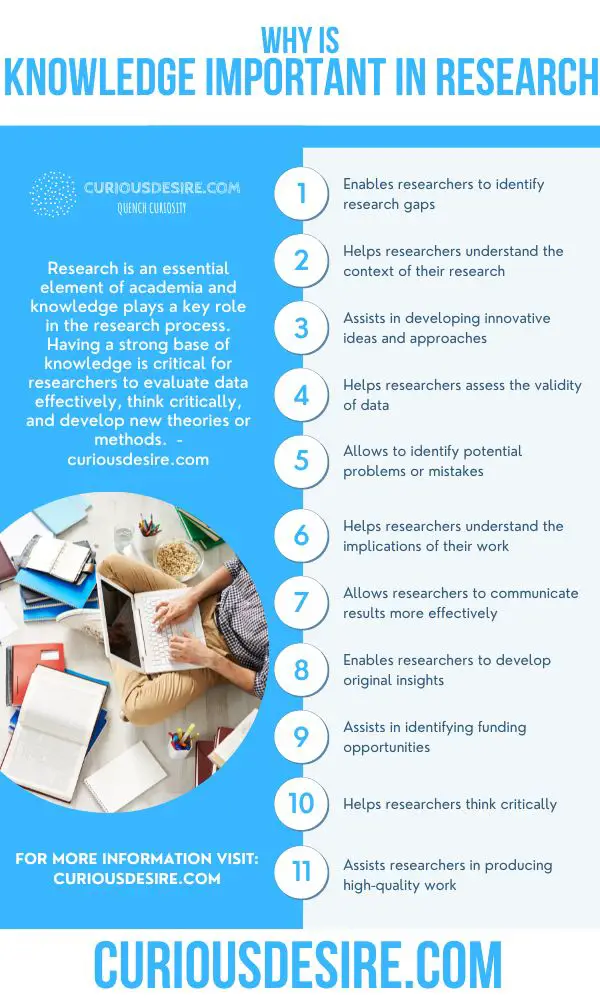Research is an essential element of academia and knowledge plays a key role in the research process. Having a strong base of knowledge is critical for researchers to evaluate data effectively, think critically, and develop new theories or methods.
It is also essential for researchers to stay abreast of emerging trends and developments in the field. In this article, we will explore 16 reasons why knowledge is important in research.
16 Benefits of Knowledge in Research
Knowledge is essential for conducting a successful research project. Here are 16 reasons why knowledge is important in research:
1. Knowledge enables researchers to identify research gaps
Knowledge helps researchers identify areas which have not been fully explored or where more research may be needed. This allows them to focus on areas that require further investigation and develop new theories or methods.
It also helps researchers develop more in-depth and accurate analyses by finding any inconsistencies that may exist in the existing data.

2. It helps researchers understand the context of their research
Having a comprehensive understanding of the literature in the field is essential for researchers to make sense of data, draw logical conclusions, and identify areas for further investigation.
Through the knowledge acquired, researchers can understand the context of their research and interpret the information in a more meaningful manner. It also allows researchers to draw connections between different pieces of research and develop new theories.
3. It assists in developing innovative ideas and approaches
Having a strong base of knowledge helps researchers come up with novel ideas or approaches which can be applied to their research. This helps them stand out from the rest and make significant contributions in their field.
For instance, knowledge about a particular field may help researchers identify an innovative solution to a specific problem. It can also help them find new methods or approaches to tackle research questions.
4. Knowledge enables researchers to identify potential sources of data
Knowledge helps researchers recognize and utilize suitable data sources for their research, allowing them to make connections, draw relevant conclusions and reach meaningful results.
Moreover, knowledge enables researchers to understand the reliability of sources and identify any biases or inaccuracies. This helps them make sure that only relevant, accurate, and valid data is used for their research.
5. Knowledge assists researchers in developing better theories
Having a sound foundation of knowledge helps researchers recognize trends and patterns, build upon existing theories or develop new ones based on their research findings. This allows them to make valuable contributions to the field.
Thorough knowledge also helps researchers understand the implications of their research and draw practical applications from it.
6. Knowledge helps researchers assess the validity of data
Data validity is crucial for research as it ensures that the conclusions drawn are accurate and reliable. It also helps researchers gain credibility in the academic community.
By having an in-depth understanding of the research process, researchers can accurately assess whether their data is valid and reliable. This helps them make more confident conclusions. So, having knowledge is essential for researchers to determine the reliability of their data.
7. It allows researchers to identify potential problems or mistakes
Having a strong base of knowledge enables researchers to recognize any errors or problems which may arise during their research process. This allows them to take corrective action, preventing costly mistakes or delays in their research project.
More importantly, knowledge helps researchers identify any ethical issues which may arise during their research and take steps to mitigate them. This is essential for ensuring that the research process is conducted in an ethical manner.

8. It helps researchers understand the implications of their work
Knowledge is essential for researchers to recognize and understand the wider implications of their work on society and the environment. This helps them make informed decisions and ensure their research is applied responsibly.
For instance, knowledge of the potential impacts can help researchers take precautionary measures to reduce any negative consequences. This is essential for protecting the safety and welfare of individuals, communities, and ecosystems.
9. It assists researchers in developing meaningful collaborations and partnerships
Having a comprehensive understanding of the field helps researchers identify potential partners and collaborators who can contribute to their projects significantly. This enables them to maximize resources, accelerate progress and share ideas effectively.
With the right knowledge, researchers can also develop meaningful collaborations with industry leaders or policymakers who can help them bring their research to life.
10. Knowledge allows researchers to communicate results more effectively
Having a sound understanding of the field and research methods allows researchers to communicate their results more effectively. This helps them reach out to wider audiences and persuade people of their findings.
Using their knowledge, researchers can create compelling visuals and stories to convey the implications of their research or explain its importance. This ensures that their message resonates with the audience and has a lasting impact.
11. Knowledge enables researchers to develop original insights
Knowledge gives researchers the ability to make observations, draw logical conclusions and form innovative theories or approaches based on their findings. This gives them a competitive edge and helps them stand out from the rest.
For instance, researchers can use their knowledge to provide meaningful insights into unsolved problems or propose alternative solutions. This allows them to make valuable contributions to the field and shape its future.
12. Knowledge assists in identifying funding opportunities
Having knowledge of the field helps researchers identify potential sources of funding for their research projects, enabling them to secure additional resources and expand the scope of their work.
Moreover, knowledge is essential for researchers to accurately present the outcomes of their research and convince funders of its potential value. This increases their chances of securing financial support and allows them to take their projects forward.

13. Knowledge enables researchers to stay up to date
Having a comprehensive understanding of the field helps researchers stay up to date with new developments, trends and theories. This allows them to remain competitive and make more informed decisions in their research process.
Simultaneously, knowledge helps researchers identify and take advantage of new opportunities for funding or collaboration. This ensures that their projects remain relevant and innovative in the long run.
14. It assists researchers in producing high-quality work
An in-depth understanding of the literature helps researchers produce higher-quality work. This allows them to make meaningful contributions, earn recognition and build a positive reputation in their field.
By having knowledge of the field and research methods, researchers can accurately interpret data, draw meaningful conclusions and present their findings in a compelling manner. This helps them make a lasting impact on the field and shape its future significantly.
15. Knowledge helps researchers think critically
Knowledge enables researchers to think more critically about their research process, challenging accepted ideas and considering alternative hypotheses or theories. This helps them push the boundaries of knowledge and come up with unique solutions to difficult problems.
For instance, knowledge gives researchers the ability to identify potential flaws or biases in theories or approaches and propose innovative alternatives. This helps them make more informed decisions and develop original insights.
16. It gives researchers the confidence to take risks
A strong foundation of knowledge helps researchers make more confident decisions, even in the face of uncertainty or risk. This allows them to explore new ideas, challenge accepted theories and pursue innovative solutions.
Through their knowledge and understanding, researchers can identify potential risks and take calculated steps to ensure successful outcomes. This helps them break through barriers and make breakthroughs in their research.
Conclusion
Knowledge is essential for researchers in order to produce meaningful and high-quality work, stay up to date with developments in the field, think critically and take risks.
Developing a comprehensive understanding of research methods, theories and trends enable researchers to identify potential problems and sources of funding, as well as form meaningful collaborations or partnerships.
Knowledge also allows them to communicate their results more effectively and develop original insights. In short, knowledge is an invaluable asset for researchers as they pursue their research projects.